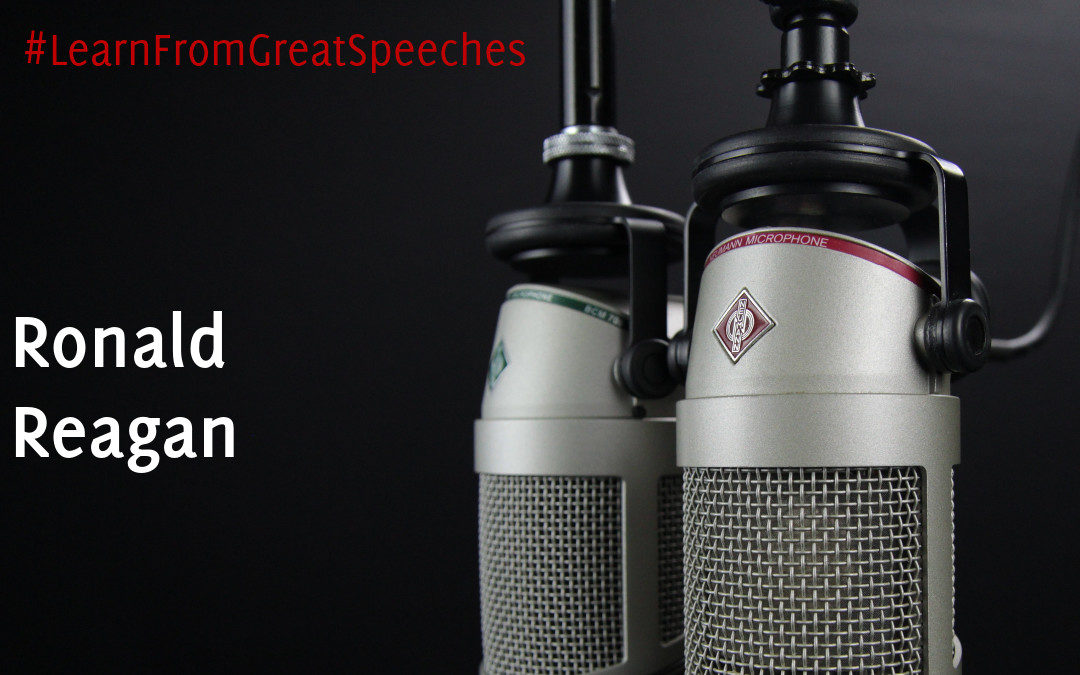We are back with #LearnFromGreatSpeeches and once more the subject is space exploration. Last time we saw Kennedy’s energy, with Ronald Reagan it’s a sad moment, it’s hours after the Challenger’s tragedy.
By coincidence it happened the same day the President of the United States of America had to deliver the State of the Union speech. He postponed by used the space to comment on the disaster with a memorable speech.
Opening
Ladies and Gentlemen, I’d planned to speak to you tonight to report on the State of the Union, but the events of earlier today have led me to change those plans. Today is a day for mourning and remembering. Nancy and I are pained to the core by the tragedy of the shuttle Challenger. We know we share this pain with all of the people of our country. This is truly a national loss.
The opening sets the tone for all the speech: the emotional side. Reagan doesn’t speak as a president, rather as an American citizen, or better as their representative and part of them. When he says share he is embracing the audience and use the emotional state to join them. An appeal to pathos according to rhetoric. Years later Bush will be called to a similar speech after September 11. In that situation, being a terrorist act, the tone is more direct and strong, the firm response to the attack by the President. Bush wants to lead and reassure the public. In this case Reagan uses emotions as a feeling to take away the barriers between him and the audience.
Antithesis
And I want to say something to the schoolchildren of America who were watching the live coverage of the shuttle’s take-off. I know it’s hard to understand, but sometimes painful things like this happen. It’s all part of the process of exploration and discovery. It’s all part of taking a chance and expanding man’s horizons. The future doesn’t belong to the faint-hearted; it belongs to the brave. The Challenger crew was pulling us into the future, and we’ll continue to follow them.
Here Ronald uses a very effective contrast between two words: faint-hearted and brave. While maintaining the understanding of the common discomfort, it positions it in a context not completely negative. He’s showing the public how to face the pain. The antithesis leads us towards the right direction, the tragedy must increase our courage and not exacerbate our fears.
Repetition
We’ll continue our quest in space. There will be more shuttle flights and more shuttle crews and, yes, more volunteers, more civilians, more teachers in space. Nothing ends here; our hopes and our journeys continue
Notice the use of the repetition, it adds emphasis, building on the previous antithesis. We will not stop, we will be brave, we will do even more.
Anamnesis
In this case we are not talking about medical history (another meaning of the word), rather than the philosophical concept by Plato. The memory as an evocation of feelings.
There’s a coincidence today. On this day three hundred and ninety years ago, the great explorer Sir Francis Drake died aboard ship off the coast of Panama. In his lifetime the great frontiers were the oceans, and a historian later said, “He lived by the sea, died on it, and was buried in it.” Well, today, we can say of the Challenger crew: Their dedication was, like Drake’s, complete.
What memories can you evoke in your speeches? In a business presentation it could be previous experiences or similar historical situations. In any case it is important that the audience is able to relate to them, if they do not know the reference you have to recall it as in this case (not everyone may remember how Drake died).
Closing
For the closing Reagan returns to the feeling of grief of the opening.
We will never forget them, nor the last time we saw them, this morning, as they prepared for their journey and waved goodbye and “slipped the surly bonds of earth” to “touch the face of God.” Thank you.
A final poetic touch, taken from John Gillespie Magee, Jr. It emphasize how this speech is based on Pathos (emotion) way more than the Ethos (credibility) or Logos (logic).
Take notice how the previous sentence evokes a visual image, surely clear in the public because presented at the time by all the newscasts, to increase the emotional impact of the closure.


Recent Comments